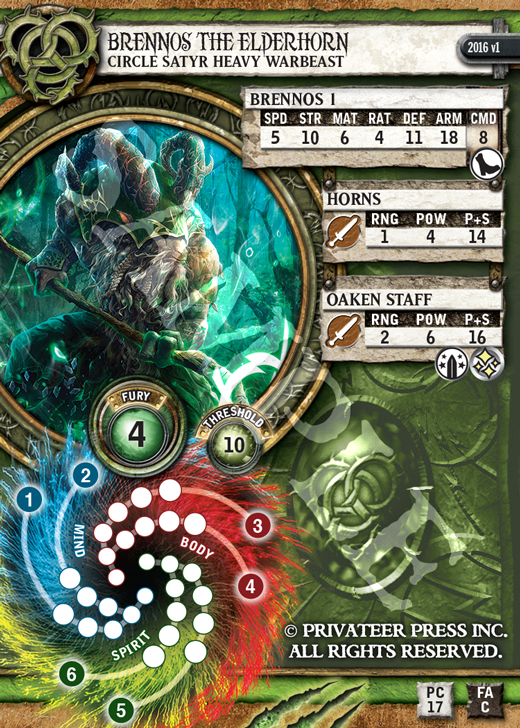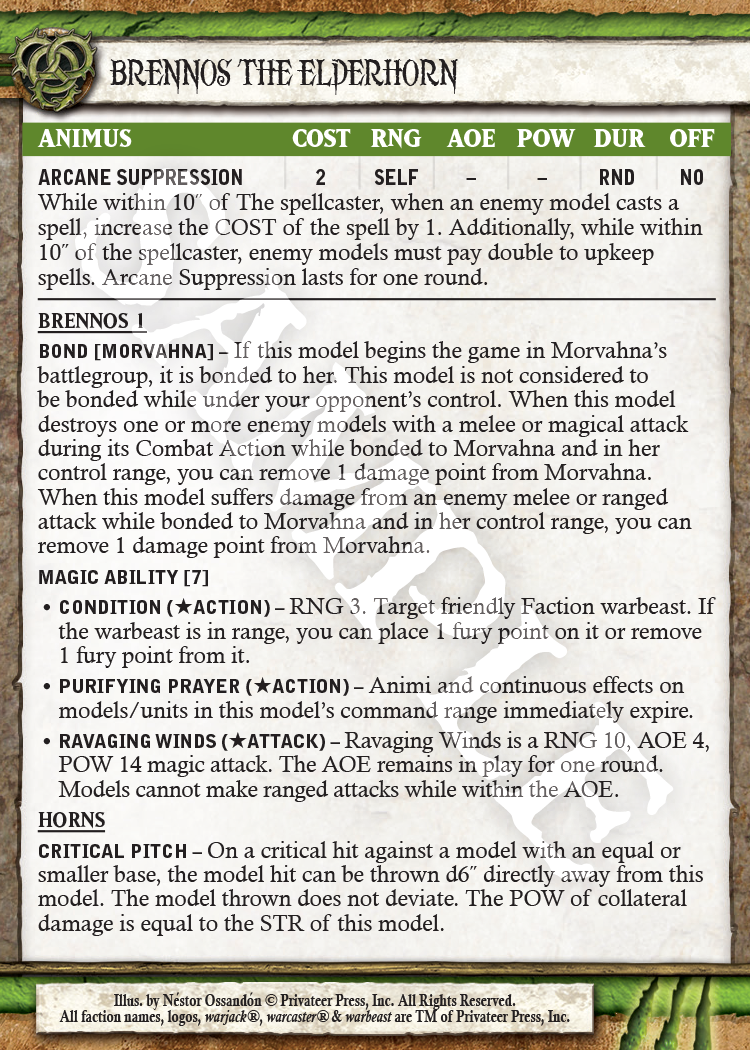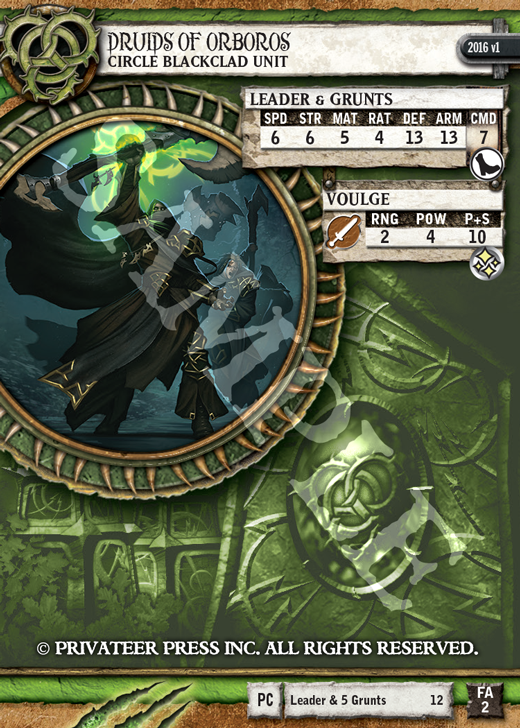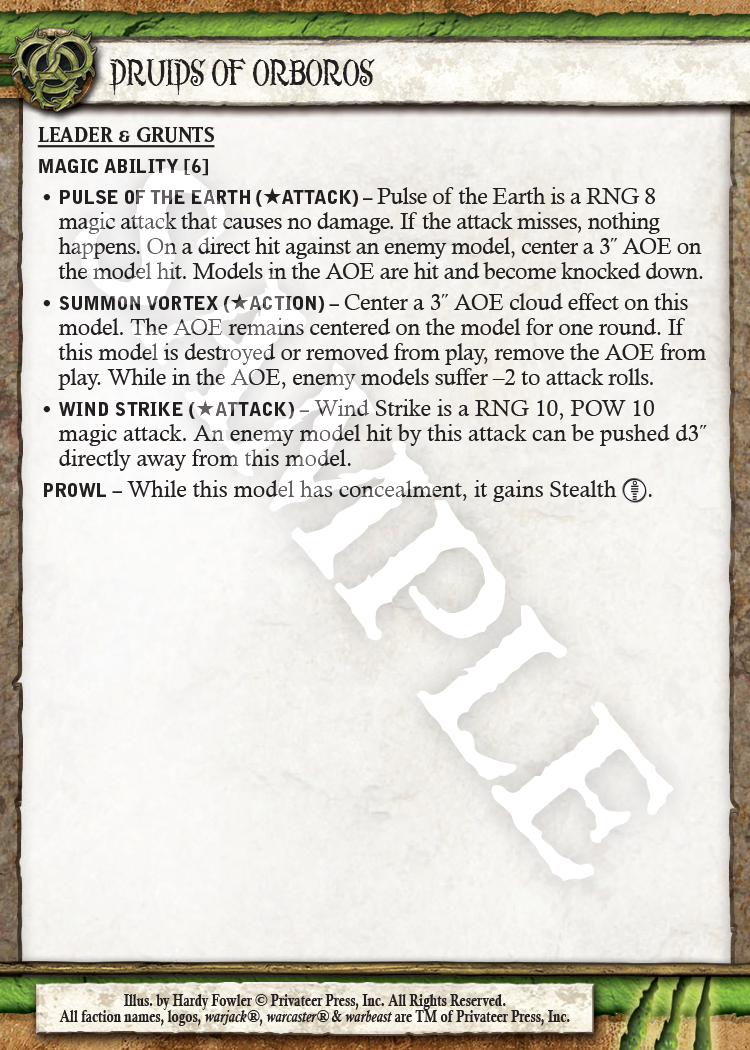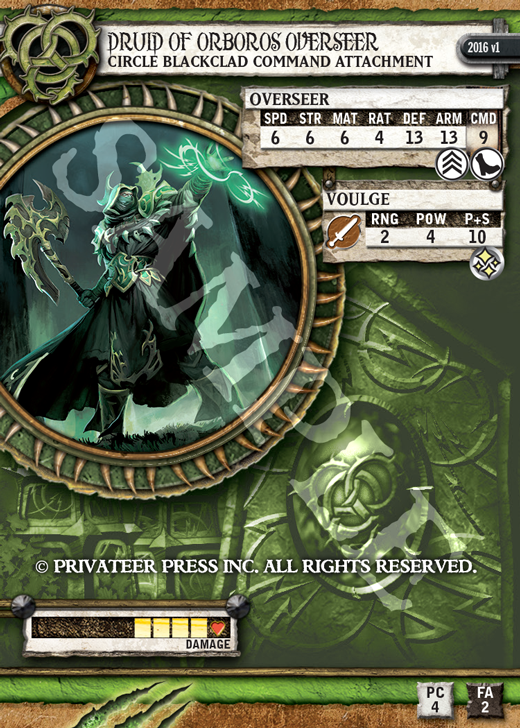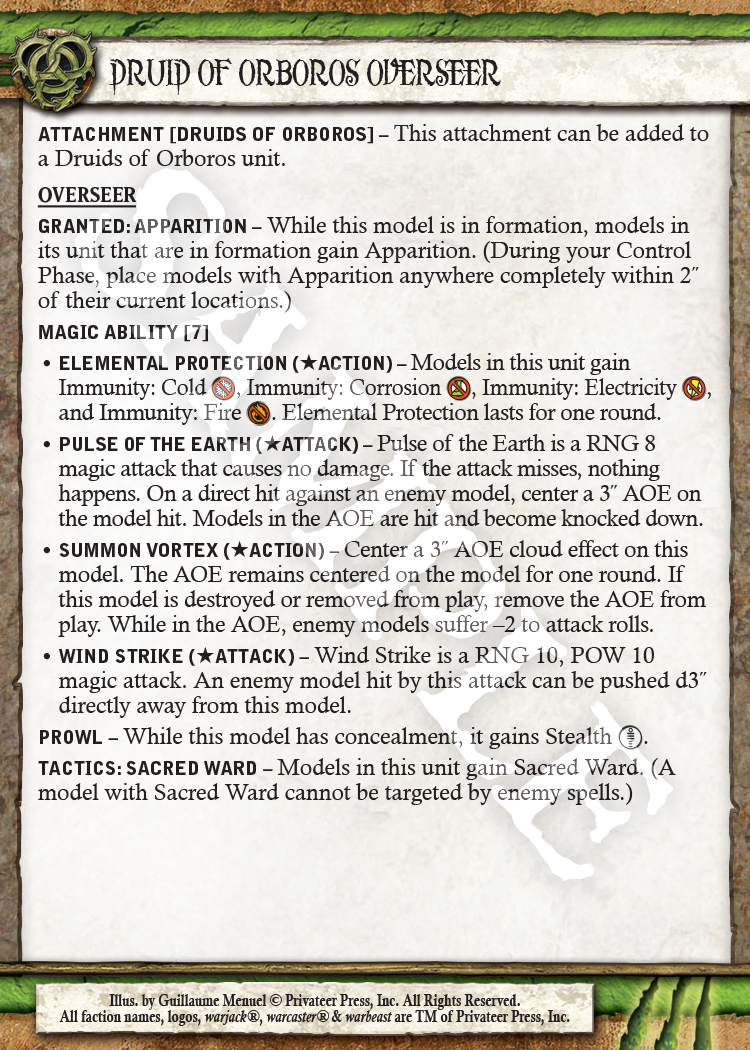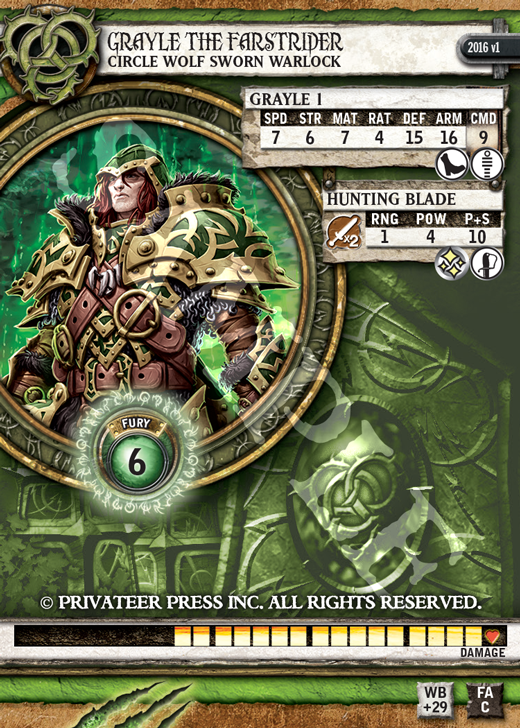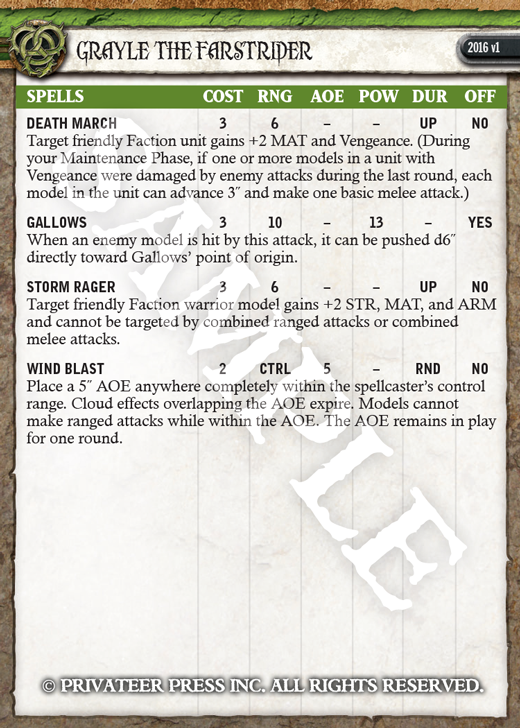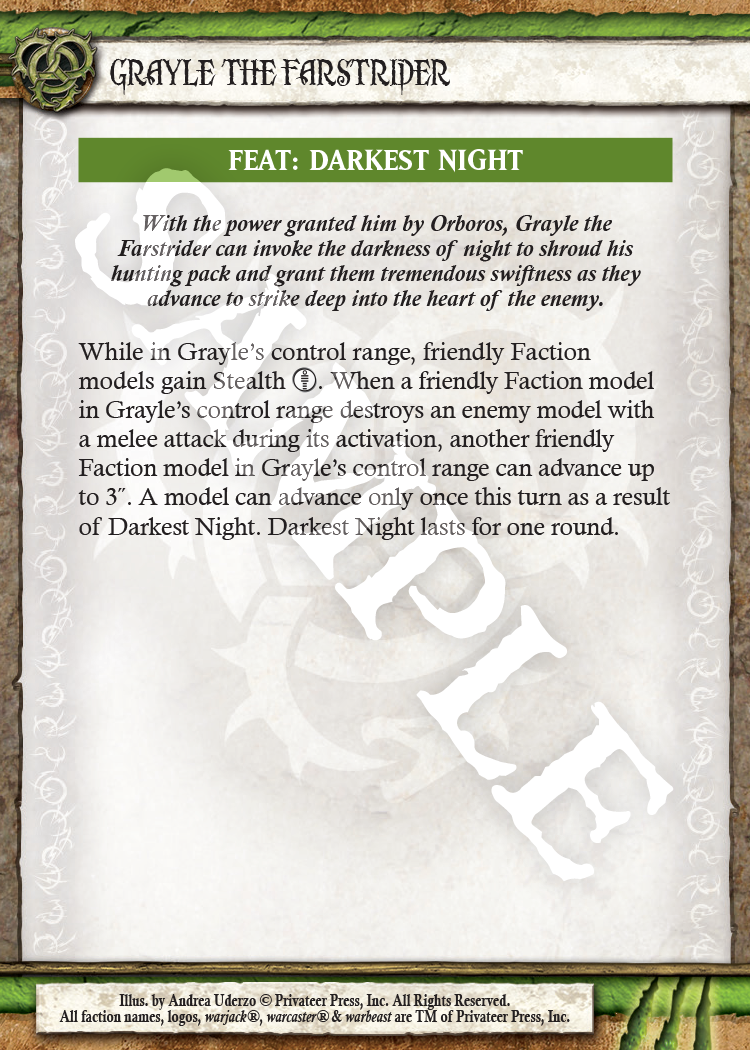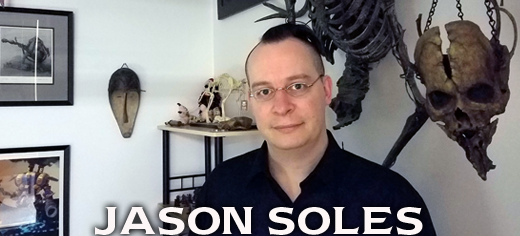
Insider 05-31-2016

The Circle Orboros is best characterized by its menagerie of wild beasts, dark rituals, potent elemental magics, and boundless maneuverability. It is a guerilla army made up of druidic spellcasters and savage feral warriors who strike without warning at the weakest spot in the enemy line. While the Circle has some access to skilled ranged combatants, it is in melee where its forces excel. Above all, the Circle Orboros is defined by its unparalleled ability to move across the battlefield and turn the terrain itself against the enemy. In other words, the Circle Orboros knows the lay of the land.
The Circle is hard to predict and harder still to pin down. The Faction has tremendous access to Flight ![]() , Pathfinder
, Pathfinder ![]() , and terrain-generating spells and abilities. It does not merely move through rough terrain with impunity; it can often place terrain where it can hamper an opponent the most. It also has plenty of place effects that enable it endless means of escape and vectors of attack.
, and terrain-generating spells and abilities. It does not merely move through rough terrain with impunity; it can often place terrain where it can hamper an opponent the most. It also has plenty of place effects that enable it endless means of escape and vectors of attack.
In the new editions, even the Circle’s warbeasts are expanding their access to Pathfinder and similar terrain-maneuvering abilities. All three Argus breeds have picked up Pathfinder in addition to trading their stat profiles with the Griffons. The Griffons are now the lightest and fastest of the Circle’s living light warbeasts while the Argus have become SPD 6, DEF 14, ARM 15. The Wild Argus (the original breed) also lost its ranged attack in favor of a Doppler Bark animus that reads, “Living or undead enemy models currently within 2˝ of the spellcaster have their base DEF reduced to 5 and cannot run, charge, or make slam or trample power attacks for one round.”
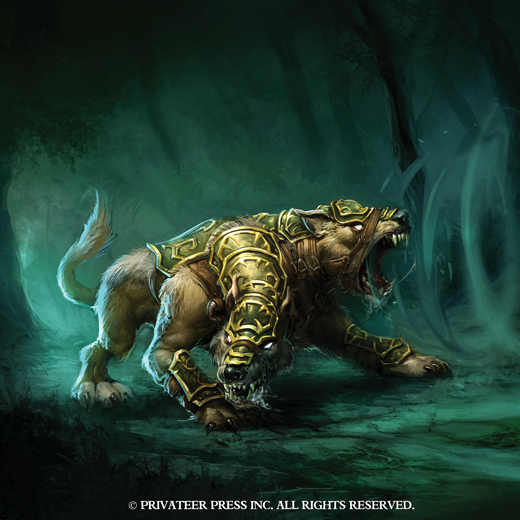
We also further differentiated the Satyrs, both from each other and from the Warpwolves. All three Satyrs went down to FURY 3, and the Gnarlhorn and Rip Horn additionally went down to SPD 5, more or less making them the economy heavies of the Faction. Having traded its Bounding animus for Earth’s Blessing—which keeps the spellcaster from being pushed, knocked down, made stationary, or moved by a slam—the Gnarlhorn now costs 12 points. At the same time, the Rip Horn gave up a point of STR and now weighs in at 14 points. Having kept its Bounding Leap, the Shadowhorn traded its old animus for Puissance, which grants the spellcaster Beat Back, and is now also 12 points.
The Warpwolves remained the versatile killing machines of the Faction’s warbeasts and changed very little… aside from gaining a couple more damage boxes here and there. Oh, and the Feral Warpwolf traded out its old animus for Primal (yes, the Gorax Rager kept it as well).
The character beasts turned out to be among the most difficult in the Faction to balance, and both Ghetorix and Brennos went through some lengthy rounds of testing. While Brennos may be the most changed from his earlier incarnation, Ghetorix also underwent a substantial transformation. Long story short, Ghetorix lost Hyper Aggressive, Ornery, and Unyielding but gained a Bond to Kromac that grants Overtake, a Murderous warp ability, and the Spiny Growth animus (it is worth noting that Spiny Growth is now target SELF).
As for Brennos… Well, see for yourself…
The wolds largely just went through some refinements in the new editions. The Woldwyrd’s Rate of Fire increased to a flat 3, though it lost a point of FURY. As with models with the Spellslave special rule, the Circle’s wold warbeasts with Geomancy can no longer cast their warlocks’ upkeep spells. And the Woldwrath gained Hyper Regeneration! For the uninitiated, Hyper Regeneration states, “Remove d3 damage points from this model at the start of each of its activations.”
Among the changes you will notice when perusing the current model rules is that the Camouflage special rule has been removed from the game. When we changed forests to only granting concealment to models completely within them, we decided that Pathfinder ![]() , Flight
, Flight ![]() , and Incorporeal
, and Incorporeal ![]() all effectively filled the role of Camouflage, since only models with these special rules could make easy use of concealment-granting terrain going forward. Camouflage ultimately felt redundant, so it was removed.
all effectively filled the role of Camouflage, since only models with these special rules could make easy use of concealment-granting terrain going forward. Camouflage ultimately felt redundant, so it was removed.
Though the Circle excels at movement tricks and placement effects, we also somewhat toned these in the new editions. Now virtually every placement effect restricts models to being placed “completely within” the specified area. In the case of the Shifting Stones, this is 8″ whether using the Shifting or Teleportation special rules.
We also made a few other tweaks. The Reeves of Orboros were streamlined to have a flat ROF of 2 with their crossbows but lost Snap Fire and went down to POW 8.
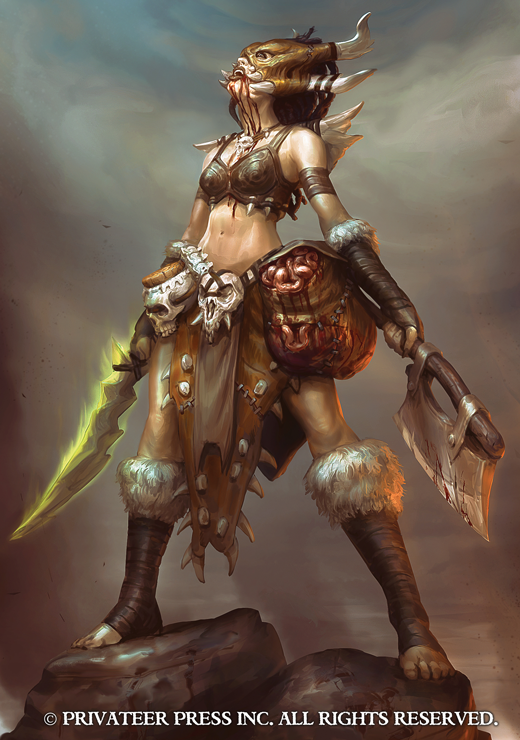
Just as we removed the movement bonus from the Bane’s Curse, we also removed it from Prey, so the Tharn Bloodtrackers are somewhat slower (if you can even consider SPD 7 slow!) while on the hunt. We also further distinguished the Tharn Wolf Riders from the Bloodtrackers by replacing Prey on the Wolf Riders with Annoyance, making them a more effective harassing unit while somewhat reducing their overall lethality.
The Bloodweavers traded Blood Spiller and Dispel for Grievous Wounds and Life Spiller, which states, “When an attack with this weapon destroys an enemy model, immediately after the attack is resolved a friendly living Faction model currently in this model’s command range can remove d3 damage points.” The loss of Dispel somewhat reduces the Circle’s ability to remove upkeep spells from play, which is in tune with one of our initiatives in the new editions. However, the tradeoff for Grievous Wounds entrenches them in the role they felt destined for.
Among the most-changed models in the Circle’s lineup were the Druids of Orboros. We decided that their ability to blanket shut-down spellcasting was something of a problem in a Faction with as much maneuverability and access to defensive capabilities like Prowl. We also decided that the table control represented by Force Bolt gave the Faction some potentially unfair advantages with their plentiful model delivery systems. So, we removed the offending abilities and retooled the druids. In the end, I have to say we were pleased with the result. Their role on the table is somewhat narrower, but they still feel true to their concept and can show up from out of nowhere to work their fell magic.
Like most of the medium infantry in the game, the Tharn Ravagers went down to 5 damage boxes, but they also acquired Tough ![]() . At the same time, the Tharn Ravager Shaman has gone through another transformation and is now a Tharn solo and spellcaster. Having traded his ranged attack for Chain Lightning, the Shaman also gained a spell called Hunter’s Grace, which keep Tharn models from being knocked down (and which pairs pretty well with Tough
. At the same time, the Tharn Ravager Shaman has gone through another transformation and is now a Tharn solo and spellcaster. Having traded his ranged attack for Chain Lightning, the Shaman also gained a spell called Hunter’s Grace, which keep Tharn models from being knocked down (and which pairs pretty well with Tough ![]() …), and Sigil of Power, which gives the weapons of the target model/unit Damage Type: Magical
…), and Sigil of Power, which gives the weapons of the target model/unit Damage Type: Magical ![]() .
.
Due to changes we made to animi in the new editions, such as many becoming target SELF only, we made some significant changes to the Druid Wilder. She lost Spirit Tap and Condition for Medicate and Shepherd’s Call (which says, “Remove up to 1 fury point from each friendly living Faction warbeast currently within 3 ̋ of this model”) and picked up Arcane Support, which allows its warlock to upkeep a spell without spending fury.
As far as the warlocks themselves go, we decided that Krueger needed to do a little more to prove he was the Stormlord, so he gained Sheltering Hand, which says, “While in this model’s command range, friendly Faction models gain Immunity: Electricity ![]() .”
.”
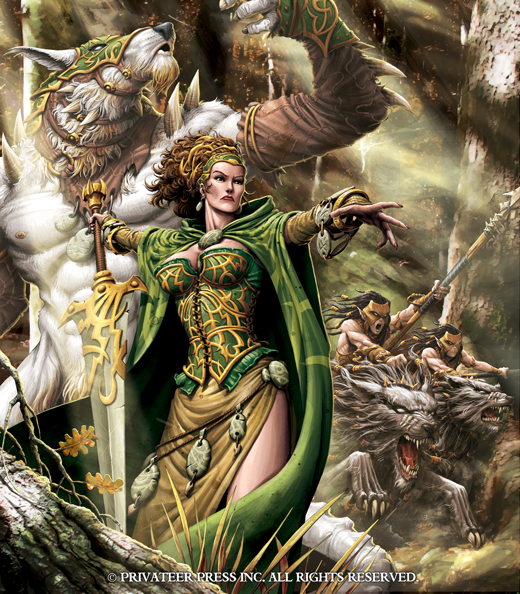
Because she is so reliant on her upkeep spells to support her play style, we took some pity on Morvahna the Autumnblade; she gained a special rule called Vital Magic. Using Vital Magic, when an effect would cause one of Morvahna’s upkeep spells to expire, she can instead keep the play by suffering d3 damage points. Keeping the scales balanced, Morvahna 2 lost Purification but acquired the slightly friendlier Censure, which states, “Upkeep spells in the spellcaster’s control range immediately expire. A spellcaster can keep any of its upkeep spells in play by suffering d3 damage points per spell. Censure can be cast only once per activation.”
Wurmwood and Cassius went through a more significant series of changes with Wurmwood reclaiming its dominance. That’s right: Wurmwood is the warlock now. The old tree also manifests the Rapid Growth spell, which enables it to make easier use of the Prowl special rule.
Grayle the Farstrider has become much more focused on leading the rank and file of the Circle Orboros into battle, especially the Wolf Sworn, a group made up of those warriors who have sworn fealty to the blackclads (including the Wolves and Reeves of Orboros and the Skinwalkers). His old Elite Cadre has been replaced, as it no longer functioned in the new rules the way it used to. Instead, he gained Tactician in its place, which offers a great deal more tactical flexibility on the battlefield.
We slightly throttled down the effectiveness of Bradigus Thorle the Runecarver. During the process of playtesting the new editions of the game, we also came to see that the Synergy spell was too strong, so we limited its potential cumulative bonus to +3 but lowered the spell’s COST to 2.
Finally, we also made some changes to Kromac, Champion of the Wurm. The first is that we had to replace the Primal Howl spell since command checks have been removed from the game. Instead, Kromac 2 gained Vengeful, which gives the target Faction model Retaliatory Strike. We also fine-tuned his feat to say, “Kromac immediately casts Carnage without spending fury. Additionally, while in Kromac’s control range, living models in his battlegroup gain +2 STR and ARM. Bloodlust lasts for one round.” Thus did we remove some redundancy from his capabilities.

